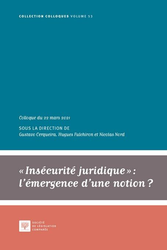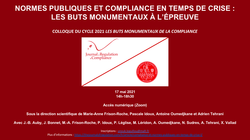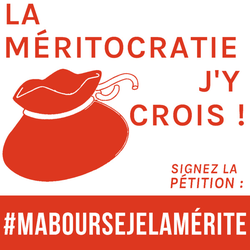Feb. 8, 2023
Publications

🌐follow Marie-Anne Frison-Roche on LinkedIn
🌐subscribe to the Newsletter MAFR Regulation, Compliance, Law
____
► Full Reference: M.-A. Frison-Roche, "Instaurer l'insécurité juridique comme principe, outil de prévention des crises systémiques catastrophiques totales" ("Establishing legal uncertainty as a principle and a tool for preventing total catastrophic systemic crises"), in G. Gerqueira, H. Fulchiron et N. Nord (eds.), Insécurité juridique : l'émergence d'une notion ?, Société de législation comparée, coll. "Colloques", vol. 53, 2023, pp. 153-167.
___
📝read the article (in French)
____
🚧read the bilingual Working Papier which is the basis of the conference and this article
____
🎤watch the conference of March 22, 2021 that took place in the Cour de cassation (French Court de cassation) and for which this reflection was globally led
____
► English Summary of the article: "whatever it takes". In 2015, Mario Draghi used this formula to aim for the defence of the European currency, when the Euro was in danger of collapsing under the dance of the speculators who would be enriched by its collapse. Rarely has a formula been more violently political and more strongly prescriptive. It contributed to his being dubbed "Super Mario", as in the video game. The formula was used again in 2020 by the Président de la République Française (President of the French Republic) in the face of the financial turmoil caused by the health crisis that led to similar calculations. It goes beyond the mere "financial cost". With this formula, the President of the European Central Bank stated that the economic crisis in Europe was such that the institution would do everything in its power to put an end to it, without any limits; that all those who, by their behaviour, even supported by their legal prerogatives, in this case the speculators, because they were destroying the economic and financial system, would come up against this and would themselves be swept away by the Central Bank because the latter's mission, in that it is absolutely to safeguard the Euro itself, would prevail "quoi qu'il en coûte" ("whatever the cost"). At one point, the master stood up. If the royal position is the seated position, when he listens and judges, it is by rising that he shows his acceptance of also being the master, because he is in charge of more and will use everything to win.
More broadly, we might consider drawing up a positive concept of legal uncertainty (which is bound to please the Hegelians), increasing legal certainty: this would make it possible to associate a clearer legal regime with the hypotheses of legal uncertainty. Indeed, rather than sweeping Law under the carpet, which explains many of the tensions between the Conseil constitutionnel (French Constitutional Council) and the Conseil d'État (Council of State) on the one hand, and the legislator and the government on the other, concerning the "État d'urgence" ("State of emergency"), we could set out the conditions in which legal uncertainty makes it possible to set aside or limit rules.
The idea proposed is therefore that in "extraordinary situations", legal uncertainty would be a dimension, or even a principle which would be admissible. And developing this first point, it is proposed that the hypothesis of an "economic crisis" justifies a dimension, or even a principle of "legal uncertainty". But this first assertion needs to be tested. Is an economic crisis, a concept that needs to be defined, if it is to have such a major reversal effect, such an extraordinary 'situation'? Furthermore, to deal with this extraordinary situation constituted by an 'economic crisis', how much legal uncertainty would be legally acceptable, or even legally claimed? Could we even conceive of a reversal of principle that would bring applicable Law to an economic crisis under the aegis of legal uncertainty? In such a case, the question that then arises is to determine the conditions and criteria for emerging from the economic crisis, or even to determine the elements of perspective of an economic crisis, which could justify in advance the admission of an injection of legal uncertainty. Above all, Law has control over the future.
The economic crisis should therefore be legally defined as an exceptional situation, before stressing that Regulation and Compliance Law, because on the one hand we move from crisis to crisis and on the other hand the whole system aims to avoid and manage the future crisis in advance or to exclude it; this is particularly true of health and climate issues (the way the health crisis was managed was to 'decree' that the State should initiate an economic crisis), which means that legal insecurity is no longer seen as a distant exception, a failure to be combated, but as a lever that can be used to influence the future.
________
Updated: Sept. 1, 2022 (Initial publication: March 24, 2022)
Thesaurus : Doctrine

► Full Reference: A. Oumedjkane, A. Tehrani & P. Idoux, "Normes publiques et compliance en temps de crise : les buts monumentaux à l'épreuve. Éléments pour une problématique" ("Public Norms and Compliance in times of crisis: Monumental Goals tested. Elements for a problematic"), in M.-A. Frison-Roche (ed.), Les Buts Monumentaux de la Compliance, coll. "Régulations & Compliance", Journal of Regulation & Compliance (JoRC) and Dalloz, 2022, p. 275-295.
____
📕read a general presentation of the book, Les Buts Monumentaux de la Compliance, in which this article is published
____
► Summary of the article (done by the Authors): In this paper, compliance refers to the fact that large private firms, through internal procedures designed to abide by public norms, participate in achieving the goals set out by public authorities, as the latter cannot reach those goals without help (proper functioning of financial markets, environment protection, fight against the corruption…). While in times outside a crisis period, the need to maintain a close link between public norms and compliance to achieve those “monumental goals” has been established, the validity of this analysis must be assessed during crisis periods. Indeed, to put an end to the turmoil as soon as possible, it is tempting to rely primarily on public authorities.
Should then be studied, in the light of the health crisis, the possibility that the link between public norms and compliance be altered in times of crisis. Not only is the normative reaction of public authorities very intense during the period, but some features of the compliance could lead one to think that compliance is in no way useful in a context of emergency and instability. This paper nevertheless suggests that to achieve monumental goals, it is necessary to maintain a close link between public norms and compliance. Such a link was maintained indeed, even at the height of the health crisis, and this should probably also be the case beyond this period, as breaking the link involves some risks which are not specific to the current health crisis. In other words, despite its shortcomings, compliance may not lose all its assets in times of crisis.
________
May 17, 2021
Conferences

 Référence complète: Frison-Roche, M.-A., La place des entreprises dans la création et l'effectivité du Droit de la Compliance en cas de crise in (dir.) Les normes publiques et la Compliance en temps de crise : les buts monumentaux à l'épreuve, colloque coorganisé par le Journal of Regulation & Compliance (JoRC) et la Faculté de droit de Montpellier, 17 mai 2021.
Référence complète: Frison-Roche, M.-A., La place des entreprises dans la création et l'effectivité du Droit de la Compliance en cas de crise in (dir.) Les normes publiques et la Compliance en temps de crise : les buts monumentaux à l'épreuve, colloque coorganisé par le Journal of Regulation & Compliance (JoRC) et la Faculté de droit de Montpellier, 17 mai 2021.
Consulter les slides sur lesquelles s'appuie cette conférence.
Regarder la vidéo de cette conférence.
Lire le programme général de ce colloque
Lire le document de travail sur la base duquel la conférence a été élaborée.
___
Ce colloque s'insère dans le cycle de colloques 2021 organisé par le Journal of Regulation & Compliance (JoRC) et ses partenaires autour des Buts monumentaux de la Compliance.
Les interventions serviront de première base à la réalisation d'un ouvrage dirigé par Marie-Anne Frison-Roche, dont la version française, Les Buts monumentaux de la Compliance, est co-éditée par le JoRC et Dalloz et dont la version anglaise, Compliance Monumental Goals, est co-éditée par le JoRC et Bruylant.
____
Résumé de la conférence : Il s'agit d'observer la façon dont les entreprises agissent lorsque la crise advient et l'impact produit sur les "Buts Monumentaux de la Compliance". Il apparaît que les entreprises ont aidé, soit sur l'ordre des Autorités publiques, soit de leur propre initiative. Toute "épreuve" étant une "preuve", la leçon à tirer de la preuve sanitaire est à retirer face à la crise environnementale dont nous sommes déjà informés.
La crise montre la place et le rôle des entreprises pour que tout d'abord survive l'effectivité du Droit de la Compliance par le souci maintenu de ses buts, grâce à l'aide requise ou spontanée des entreprises.
Mais plus encore l'on a pu observer des entreprises actives en raison de leur "position" pour des buts qui n'étaient pas les leurs, comme l'environnement. L'on retrouve alors la définition générale du Droit de la Compliance comme l'alliance en Ex Ante entre Autorités publiques et opérateurs privés cruciaux, pour maîtriser le futur. Ce sont les juges qui les assignent à cette alliance, ici et maintenant. La crise sanitaire en accélère la construction.
April 15, 2020
Thesaurus : Doctrine
Référence complète : Gelblat, A. et Marguet, L., État d’urgence sanitaire : la doctrine dans tous ses états ?, Revue des droits de l'homme, avril 2020.
____
Oct. 19, 2014
Blog

La presse qui relate les décisions de justice prend-elle le temps, la peine, de les lire ?
Par exemple, par une Ordonnance du 17 octobre 2014, Mme L. et autres, le Conseil d'État a suspendu l'application de la circulaire du 18 juillet 2014 qui supprime la condition de "mérite" pour des aides financières apportées aux étudiants. Ce juge des référés ne fait que suspendre l'application, l'instance au fond, en vue d'obtenir l'annulation, se poursuit et l'on ne connaît pas encore son résultat.
Mais la presse, par exemple l'article paru dans Le Monde, titre : "Le Conseil d'Etat annule la suspension des bourses au mérite". Pourtant, le Conseil d'État n'oblige pas à lire le texte même de ses décisions. Il y associe des communiqués de presse, accessible sur la première page de son site. Cela ne suffit pas, la presse confond une décision au fond, d'annulation, et une décision de référé, provisoire, de suspension. Pourtant la différence est importante : on ne sait pas encore à ce stade si cette circulaire est légale ou illégale.
Or, le grief développé au fond et ici pris en considération par l'Ordonnance du 17 octobre 2014 relève de l'art de la définition et de la qualification : le Gouvernement a le pouvoir de "fixer les conditions" : peut-on considérer que supprimer la condition relève encore de la fixation des conditions ?
Seul le Conseil d'État statuant au fond répondra à cette question, qui relève de la logique juridique.